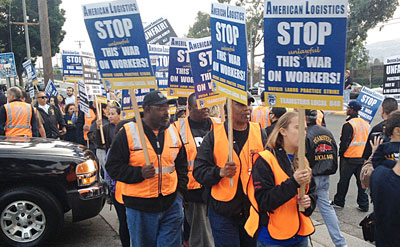

Vol. 77/No. 44 December 9, 2013

|
| Warehouse Workers United |
| Truckers fighting for Teamsters union contract at ports of Los Angeles and Long Beach picket American Logistics truck depot and warehouse in Carson, Calif., Nov. 18 during 36-hour strike. |
An estimated 100 drivers who work for three companies — Green Fleet Systems, American Logistics International and Pacific 9 Transportation — participated in the coordinated action. Supporters of the Teamsters organizing drive at Green Fleet also held a 24-hour strike in August.
During a visit to the picket lines at American Logistics and Green Fleet facilities here, drivers temporarily blocked trucks from going in and out. Chants, marches and rallies marked the round-the-clock disciplined picket lines, and truck drivers and other passersby honked in solidarity. At the same time, drivers who work for Pacific 9 Transportation picketed outside that company’s facilities in Long Beach.
Strikers at the American Logistics picket line said two pickets had been hit by a truck and suffered minor injuries shortly before the walkout ended at 4 p.m. the next day. One of those hit works for another nonunion trucking company and came to show solidarity and learn about the organizing drive.
“Organizing and unionizing — this has to be done, and actions like this give us confidence,” James Love told the Militant at the picket line here Nov. 18.
“I’m here now because I believe in this drive,” said Daniel Perry.
Both Love and Perry said they were terminated for pro-union activity by American Logistics.
Strikers say they are demanding the companies end retaliatory firings and other intimidation against supporters of the Teamsters union, who are fighting for safer working conditions, higher wages and overtime pay and respect.
The three companies have not returned calls requesting comment.
Port truck drivers from around the country joined the picket lines, including five from Savannah, Ga.
“Their problem is our problem. That’s why we are here,” said Yosief Belay, who came from the Port of Seattle in Washington to join the picketing.
“Safety is one of the most important issues in the industry and one reason we need unions,” said Rene Noel from Toll Group at the Port of Newark, New Jersey, who flew in to join the action. Noel said three truckers were killed at work at the port last year.
In July 2013, 70 percent of the 112 Toll drivers who work at the Newark port voted to join Teamsters Local 469. They are fighting for a contract similar to that won in December 2012 after a two-year fight by members of Teamsters Local 848, who work for Toll Group in Los Angeles. That contract codifies wage increases of $6 an hour, overtime pay, lower employee health care costs, paid holidays, sick days and personal days.
Truckers from Toll Group, the only large company at both Los Angeles and Long Beach ports with a union contract, joined the picket lines at the three struck companies.
Supporters of Warehouse Workers United, a group that is backing drives to improve working conditions and wages at warehouses, walked the American Logistics International picket line and held a news conference on the conditions their members face.
Warehouse Workers United organizer Guadalupe Alma told the media that they had filed a complaint with the state Occupational Safety and Health Administration citing unsafe conditions, which include workers trapped in trailers while forklifts are operating, exposure to hazardous material without proper training, working under boxes stacked as high as 30 feet and lack of separate bathrooms for men and women.
“We stand with the warehouse workers,” Teamster supporter Leslie Richard told the press. “We are here because we need to win being treated with dignity and respect and to win a union.”
With the deregulation of the trucking industry in the 1980s, more trucking companies classified employees as “contractors” or independent owner-operators as a way to get workers to bear costs of fuel, repairs and wait time and as a scheme to say they are not entitled to union membership.
Workers at American Logistics are classified as workers, but get paid by the load, not by the hour. At Green Fleet, workers say the company is cutting the loads of workers who are part of the organizing effort, and have categorized some workers as independent contractors not entitled to overtime pay.
“There was no problem when we went back to work. We let the company know we’ve put up with the unfair treatment as long as we can, and that they are going to get a fight,” Leslie Richards who works at American Logistics said by phone Nov. 19 after the strike ended. “The mood was quiet. I don’t want workers who haven’t decided to support the union yet to get the wrong impression, so I listen to what they have to say.”